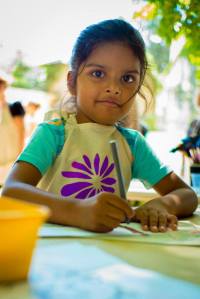 Into the midst of searing revelations at the Royal Commission into Institutional Responses to the Sexual Abuse of Children came the soothing balm of Children’s Day, March 9, at Kamballa, North Parramatta. Organised by the Parramatta Female Factory Precinct: Memory Project, led by former Parramatta Girl, Bonney Djuric, Children’s Day was designed to remember the children who once lived there and to imagine a much happier creative future for the first purpose-built orphanage for Catholic children.
Into the midst of searing revelations at the Royal Commission into Institutional Responses to the Sexual Abuse of Children came the soothing balm of Children’s Day, March 9, at Kamballa, North Parramatta. Organised by the Parramatta Female Factory Precinct: Memory Project, led by former Parramatta Girl, Bonney Djuric, Children’s Day was designed to remember the children who once lived there and to imagine a much happier creative future for the first purpose-built orphanage for Catholic children.
The site of the old Parramatta Girls Home, also known as the Parramatta Girls Training School, began as the Roman Catholic Orphanage in 1844 and adjoins the site of the 1823 colonial Female Factory. The long history of maltreatment of women and children under their authority came to an official end in 1974, but the intergenerational impact of shame, hurt and low self-esteem continues.
In warm sunshine and the peaceful shade of old trees, more than 10 former Parramatta Girls came back to the site of their teenage incarceration to share in Children’s Day, For at least three of the women, it was their first return visit in the decades since their release. They felt the need to confront painful memories and with the support of friends and organisers, to begin the process of healing.
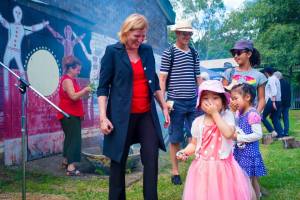 A cleansing Darug smoking ceremony launched proceedings. Central to the day’s activities was access to Bethel, the children’s hospital built in 1862, where 129 children died and were buried in unmarked graves in North Parramatta cemetery. Some of the Parramatta Girls later endured their worst abuse there. Inside was an exhibition related to the past history of the site, while surrounding the outside of the building was a newly developed garden, where colourful flowers created from recycled plastic bottles were added by children and adults throughout the day.
A cleansing Darug smoking ceremony launched proceedings. Central to the day’s activities was access to Bethel, the children’s hospital built in 1862, where 129 children died and were buried in unmarked graves in North Parramatta cemetery. Some of the Parramatta Girls later endured their worst abuse there. Inside was an exhibition related to the past history of the site, while surrounding the outside of the building was a newly developed garden, where colourful flowers created from recycled plastic bottles were added by children and adults throughout the day.
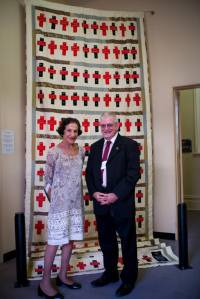 The kindly presence of the Governor of NSW, Professor Marie Bashir, (once a GP at nearby Pendle Hill and a child psychiatrist) added greatly to the sense of change, respect and healing. Here she stands with Brother Tony Butler in front of the quilt created by Bonney Djuric to remember the children who died at Bethel. Brother Tony is descended from the Day family, whose four little girls were admitted to the Roman Catholic Orphanage in 1859.
The kindly presence of the Governor of NSW, Professor Marie Bashir, (once a GP at nearby Pendle Hill and a child psychiatrist) added greatly to the sense of change, respect and healing. Here she stands with Brother Tony Butler in front of the quilt created by Bonney Djuric to remember the children who died at Bethel. Brother Tony is descended from the Day family, whose four little girls were admitted to the Roman Catholic Orphanage in 1859.
Most of the girls detained from as young as 11, were charged with “being exposed to moral danger” or neglect as a result of poverty and homelessness. From 1909, Aboriginal girls could be detained simply because they were Aboriginal.
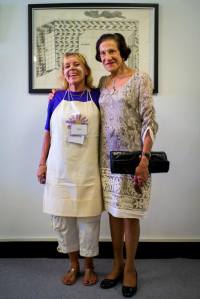 After the ignominy of being a Parramatta Girl sent to the old Hay Gaol for more severe punishment, Aboriginal artist Jeannie Gypsie Hayes was thrilled with the Governor’s interest in her art. The growing collection of Jeannie’s heartfelt art works and poetry provides a vivid insight into the grim institutional life of girls at both institutions.
After the ignominy of being a Parramatta Girl sent to the old Hay Gaol for more severe punishment, Aboriginal artist Jeannie Gypsie Hayes was thrilled with the Governor’s interest in her art. The growing collection of Jeannie’s heartfelt art works and poetry provides a vivid insight into the grim institutional life of girls at both institutions.
Organising team members included Bonney, Jeannie, artist Liz Day, Aboriginal artist Leanne Tobin, and new media artist and photographer, Mike K Chin. Mike was instrumental in organising assistance from young members of the Mormon Church with early work on the garden and cleaning up the buildings. A large contingent of young church choir members sang for the ceremony officially dedicating the Children’s Garden. Thanks to Mike for the use of his photos.
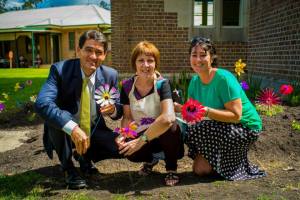 Taking their turn at planting whirly daisies in the children’s garden were three people who will be critical to the successful realisation of plans for the North Parramatta Heritage Precinct – Dr Geoff Lee MP, Bonney Djuric, and Tasha Burrell of Urban Growth NSW. Bonney’s vision includes transforming the Parramatta Girls Home site to Australia’s first national Site of Conscience.
Taking their turn at planting whirly daisies in the children’s garden were three people who will be critical to the successful realisation of plans for the North Parramatta Heritage Precinct – Dr Geoff Lee MP, Bonney Djuric, and Tasha Burrell of Urban Growth NSW. Bonney’s vision includes transforming the Parramatta Girls Home site to Australia’s first national Site of Conscience.
Arts funding from state and federal governments enabled the employment of additional services including Marily Cintra’s from Health and Arts Research Centre.
The next event will be the play Parramatta Girls, by Alana Valentine, at Riverside Theatres, May 1-7, 2014.



